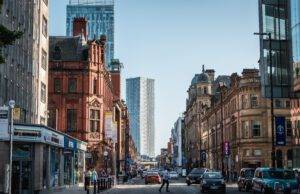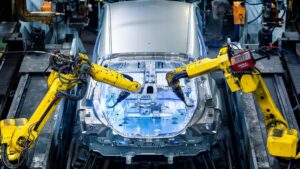The Rise of Mixed-Use Developments: Opportunities for Business Owners

<?xml encoding=”utf-8″ ?????????>
In the ever-evolving urban development landscape, mixed-use developments have emerged as a prominent trend, reshaping how we live, work, and play.
Traditionally, cities were organised into distinct zones, with residential, commercial, and industrial areas kept separate. However, the rise of mixed-use developments represents a paradigm shift, as these versatile spaces blend various functions into cohesive, interconnected communities. For business owners, this trend opens up opportunities to thrive in dynamic environments catering to diverse consumer needs.
With the help of TK Property Group, a specialist in UK property investments, this article explores the rise of mixed-use developments and how businesses can benefit from the unique opportunities these projects provide.
The Evolution of Mixed-Use Developments
When we describe these developments as ‘mixed-use’, the most simplistic definition is that they can be used for different purposes. For example, a residential development only consists of homes where people can live, whereas a mixed-use development may combine living with leisure or commercial facilities. An excellent example of a mixed-use project is the Crown View development in Manchester, part of a £4 billion regeneration scheme incorporating luxury living with retail therapy, cultural offerings, vibrant dining and more.
Mixed-use developments have gained traction due to changing societal preferences and the desire for more sustainable, walkable, and efficient urban spaces. These developments integrate residential, commercial, and often recreational components within the same area, fostering a sense of community and reducing the need for extensive commuting. The trend is rooted in urban planning concepts that prioritise creating vibrant, liveable neighbourhoods where people can access nearby services, amenities, and job opportunities within minutes.
Benefits for Business Owners
There are many benefits that mixed-use developments offer to residents and consumers, but it’s important to note that businesses can also take massive advantage of these sites. Companies can enjoy increased footfall, greater engagement with the community and more. Below are some examples of the advantages business owners can reap from a mixed-use site.
Increased Foot Traffic and Customer Base
One of the critical benefits for businesses in mixed-use developments is the potential for increased foot traffic. With residents, workers, and visitors coexisting in the same area, companies can tap into a diverse customer base. Whether it’s a restaurant, retail store, or service-oriented business, the constant flow of people creates more opportunities for customer engagement and sales.
Synergy Among Businesses
Mixed-use developments encourage synergy among businesses. For example, a residential building might house a gym, a grocery store, and a coffee shop on the ground floor. This interconnectedness fosters a sense of community and convenience for residents, creating a positive environment for businesses to collaborate and cross-promote.
Adaptability to Changing Market Trends:
The flexibility inherent in mixed-use developments allows businesses to adapt to changing market trends. For instance, a retail space might transition into a co-working area as demand for remote workspaces grows. The ability to respond to evolving consumer needs ensures that businesses remain relevant and resilient in the face of economic shifts.
Enhanced Lifestyle Appeal
Businesses operating within mixed-use developments can benefit from the enhanced lifestyle appeal of such environments. Residents and workers often choose these spaces for their convenience, walkability, and access to amenities. Businesses aligning with and contributing to this lifestyle appeal will likely attract a more engaged and loyal customer base.
Sustainability and Environmental Considerations
Many mixed-use projects are designed with sustainability in mind. By incorporating green spaces, energy-efficient buildings, and alternative transportation options, these developments appeal to environmentally conscious consumers. Businesses that align with these values can capitalise on the growing demand for sustainable practices and contribute to the overall eco-friendly atmosphere of the community.
Challenges and Considerations
While the opportunities within mixed-use developments are abundant, business owners must also navigate challenges. Competition for prime locations, the need for adaptability, and potential regulatory complexities require careful consideration and strategic planning. Additionally, businesses need to understand the unique dynamics of the community they operate in, tailoring their offerings to meet residents’ and workers’ specific needs and preferences.
Final Reflections
The rise of mixed-use developments represents a transformative shift in urban planning, creating dynamic spaces catering to modern communities’ diverse needs. For business owners, this trend offers many opportunities, from increased foot traffic to the ability to adapt to changing market trends. By embracing the principles of mixed-use development and tailoring their strategies to align with the unique characteristics of these environments, businesses can position themselves for success in the ever-evolving urban landscape. As mixed-use developments continue to flourish, the symbiotic relationship between companies and the communities they serve will play a crucial role in shaping the future of urban living and commerce.




